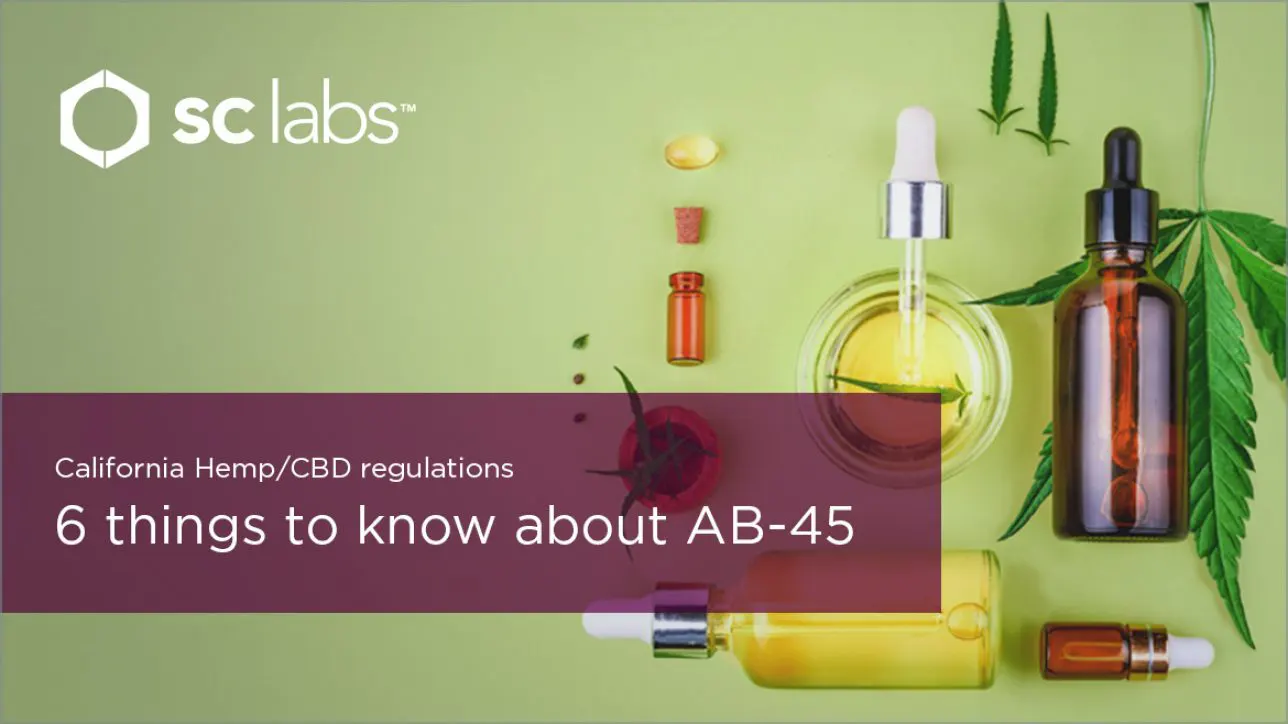Service Notification
California Governor Gavin Newsom recently signed AB-45 into law regarding industrial hemp products and sets the trajectory for the production and sale of hemp-derived CBD products in the state.
The new law has a number of provisions for registrations and labeling but we wanted to break down the testing requirements specifically. Here’s what you need to know about the new law as it relates to the testing of hemp products.
- CBD can be added to other products – Hemp-derived CBD can now be added to other products including food and beverages, dietary supplements, cosmetics, and processed pet food. This has been prohibited in the past.
- Testing for THC concentration – Before a hemp-derived extract is added to other products, it must be tested in raw form to ensure that the THC concentration does not exceed the mandated 0.3% Total THC.
- THC/comparable cannabinoid definition – Delta-9 and THCA, as well as Delta-8 THC and Delta-10 THC, are included within the statutory definition of “THC” or “THC or comparable cannabinoid.”
- Testing for contaminant levels – Hemp-derived products are now required to be tested in parity with cannabis regulations. This means testing for a range of contaminants including pesticides, mycotoxins, residual solvent/processing chemicals, heavy metals, microbials, and other foreign material on the product in its final form.
- Product labeling – This new law requires increased transparency of test results. Product labels must include links to testing results showing the Certificate of Analysis (COA) of the final form product batch by an independent testing laboratory that includes at minimum, total THC, any marketed cannabinoids and levels within the product batch, and results from safety/contaminants testing. Additional contact information will be required on the COA too.
- Products that fail testing – Producers should fear not. Batches that failed testing may be reprocessed or remediated. Those that fail may not be distributed or sold until the reprocessed or remediated batch has been retested and passed all requirements. Remediation is not permitted once a product enters the retail market.
Aside from new hemp/CBD testing regulations, AB-45 covers many other topics too, e.g., strict label requirements regarding unsubstantiated health claims, possible steps to combine hemp/CBD products within the cannabis supply chain, combined enforcement through the California Department of Food and Agriculture, State Department of Public Health, and Department of Cannabis Control, plus much more. We encourage hemp cultivars and processors to review the regulations closely.
We are ready to respond to regulations
For years, SC Labs has helped clients navigate continuously shifting dynamics in the hemp testing industry. Our R&D tests and CA Hemp Test Panel are great first steps to prepare for AB-45 compliance testing and solve for any unexpected issues. Now is the time to start testing your hemp/CBD products to ensure compliance and/or solve for any unexpected results.
- Expansive CA hemp test menu covers a full range of product types—each designed to meet AB-45 regulations
- Streamlined test management platform offers step-by-step functions to help you identify and understand regulations
- Fully integrated QR codes and labels tie test results for every sample and product analyzed
- Test methods and quality standards that produce dependable, rapid results, consistent with regulations
- Proactive data review, remediation strategy review, and root cause analysis on all failing results
With 12 years of experience operating in this environment, SC Labs is committed to monitoring regulatory changes, analyzing potential impact, and developing solutions that meet unique client needs.
Ask your SC Labs sales representative about discounted pricing through the rest of the year.
If you have questions about these new regulations and want to ensure your current process is covered in our services, call (866) 435-0709, or email info@sclabs.com.
SC Labs is broadly distributing this bulletin in order to bring to the attention of users of the affected SC Labs tests. SC Labs recommends that all users determine the applicability of this information to their individual situations and take appropriate action. SC Labs does not warrant that this information is necessarily accurate or complete. SC Labs shall not be liable for technical or editorial errors or omissions contained herein.

